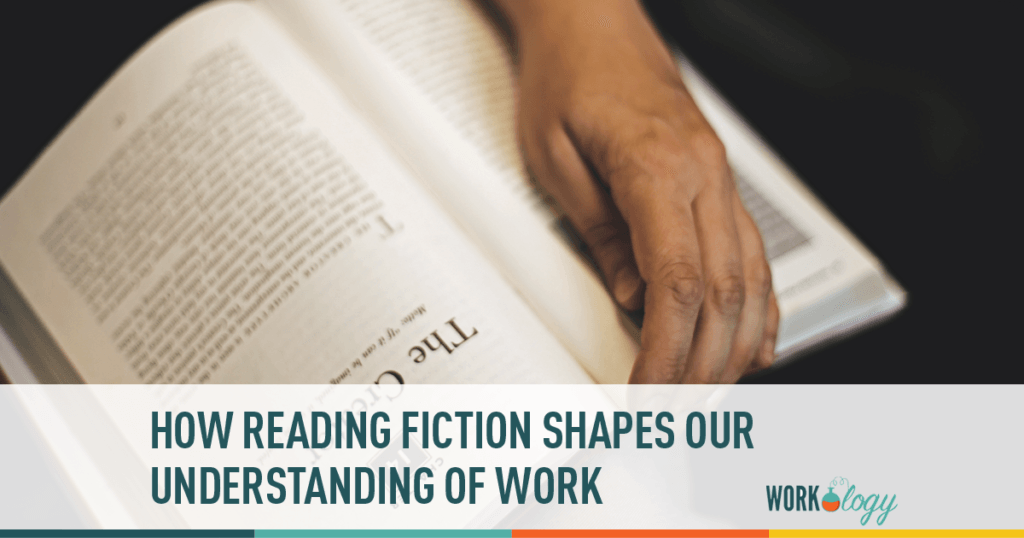I chose English as my major because I enjoy reading. What can one do with a BA in English, then? Obviously work in HR—at least, that’s where my life has taken me. When drafting policy, knowing where to put the commas and when to use affect or effect have been helpful, but I feel that the principles I’ve acquired through reading have helped me approach my profession in human resources equally as well. In today’s piece, I’ll discuss how my love of reading has improved my HR skills and examine some lessons from two fictitious businesses.
HOW READING AFFECTS US
In 2013, the Department of Labor released a list of books that shaped work in America in order to commemorate their centennial. The list includes classic novels like Little Women and Grapes of Wrath as well as more recent nonfiction works by people like Sonia Sotomayor and Stephen Covey. In addition, a recent study by Dr. Gregory S. Berns shows the positive affects reading a novel can have on brain connectivity.
While waiting for a cup of coffee, while most people reach for their phones to pass the time, I usually reach for a good, old-fashioned paper book—not even a Kindle, just paper for me! I frequently find ways to fit fiction into each spare minute I can find, whether I’m engrossed in someone else’s fictitious world or working on my own stories.
Therefore, it comes as no surprise to me that books have an impact on how we think and how our brains process information. Reading, listening, and watching stories can provide us with important insights into ourselves and help us learn new things. Shakespeare was examining tried-and-true issues that apply to our lives no matter what century we are in, which is why his works are still relevant today.
MENTORING NEW HIRES
One of my favorite fictional workplaces is the Jurisfiction office in the Thursday Next series by Jasper Fforde. The workplace Fforde creates is humorous and filled with the kind of personality conflicts, drama and management styles you would find in a real workplace. In Lost in a Good Book and The Well of Lost Plots, the second and third books in the series, Thursday Next finds herself apprenticed to Miss Havisham from Charles Dickens’s Great Expectations. She is working at Jurisfiction, the organization that polices the fictional world to make sure characters are sticking to their storylines. Miss Havisham is tough and expects a lot out of Thursday. She shows her around the fictional world and guides her through on-the-job training.
One aspect of Fforde’s direct portrayal of Miss Havisham that I enjoy is how she lays out her expectations for Thursday right away. We toss new hires into occupations much too frequently in the hopes that they would pick up the necessary skills just by being there. Because training takes time and there are always a lot of other things that require our attention, it would be wonderful if this were the case. However, it doesn’t do much to make an employee feel at home.
REMEMBERING THE HUMAN PART OF HUMAN RESOURCES
Kurt Vonnegut’s first novel, Player Piano, takes place in the future and looks at what happens when almost every job has been replaced by a machine. What happens to the workplace when humans no longer figure prominently in human resources? In the machine-filled future imagined by Vonnegut, people create jobs that are essentially busy work in order to give their lives purpose. In fact, people assigned to the army train with wooden rifles just to give them something to do. They are never really going to fight because machines are actually fighting all the wars, not people.
The book by Vonnegut presents a bleak image of machine dependence. I was impressed by how technology has altered the workplace when I read this book a few years ago. As more and more manual jobs are automated, workplace productivity and safety have substantially increased, but occasionally technology can have a detrimental impact on how people view their work. We must take into account how process automation may impact the workers in our organization. In some circumstances, it can reduce an employee’s value or perhaps render them unnecessary.
In order to avoid devaluing people’s skill sets, technology must be used in a way that improves people’s work. To ensure that your employees continue to experience a sense of purpose as technology transforms the way we work, training and learning new skills should be a constant aspect of your workplace. Think of Player Piano as a fairly dramatic and cautionary narrative about what happens when we ignore the human element of work.
IN THE END…
Whether we are reading, listening to or telling them, stories shape our understanding of the world and help us see things in new ways. What are some of your favorite fictional workplaces, and what lessons have you learned from them?
Photo Credit: Tim Pershing










2 Comments
Stephanie:
On my blog/video of today at my website I mention that one of the skills needed by anyone going into HR in the future is to be a reader of novels.
http://omegahrsolutions.com/2014/01/future-friday-advice-for-future-hr-professionals.html
You learn a lot about people from fiction.
Michael, thanks for sharing your post and for reading mine. Given that HR is a field that draws people from a variety of educational backgrounds, I think it is good to talk about how we draw our HR skills from all the areas that you mention.
By the way, some of your recent posts on technology and robots in the workplace got me thinking about Vonnegut’s Player Piano and how I might mention it in my post.
Comments are closed.